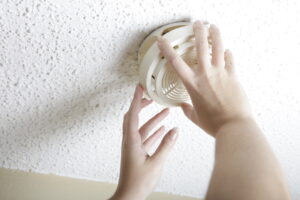 Do you use a gas furnace in Fountain, CO to heat your home through winter? Then we want to talk to you about an important part of keeping you and your family safe each year.
Do you use a gas furnace in Fountain, CO to heat your home through winter? Then we want to talk to you about an important part of keeping you and your family safe each year.
We’re familiar with providing heating service to homes in Colorado Springs, and an important part of what we do is ensuring our customers have gas furnaces that work safely. Although gas furnaces are designed with safety uppermost in mind, and gas furnaces are not automatically dangerous devices, there are potential hazards homeowners need to be aware of.
The Carbon Monoxide Danger
The main danger we’re concerned about is carbon monoxide (CO) leaks. This byproduct of natural gas combustion is extremely toxic, but is also colorless and odorless, making it difficult to detect. Every year there are troubles with carbon monoxide poisoning in homes in the area, and this includes fatalities. But with the right precautions, you and your family can stay safe with your gas heater each winter, protected from carbon monoxide poisoning.
We’ve talked before about safety steps to take to see that your furnace operates safely: always scheduling regular fall maintenance with our technicians, keeping the area around the furnace clear, calling for repairs promptly whenever something goes wrong, and having carbon monoxide detectors in the house. But there’s something important to know about those CO detectors, which is that they don’t last forever.
Testing CO Detectors Is Important—So Is Replacing Them
Your home’s CO detectors (which are often smoke detectors as well) need to be tested at least twice a year, once in spring and once in fall. Some manufacturers even suggest monthly testing. If the detector runs on batteries, they need to be changed every six months.
But this testing isn’t enough. You can’t keep doing this year after year for the rest of the time you own your house and expect the detectors will always function. Carbon monoxide detectors have a limited lifespan and will wear down over time, eventually becoming less sensitive. They may still respond to the “test” button, but they may not respond to an actual carbon monoxide leak.
Carbon monoxide detectors have a service life of 5 to 7 years. This is your key takeaway from this blog. The sensors in the detector will stop functioning fully, or at all, after this period. You can check with the manufacturer of your specific model of CO detector to find their recommended replacement schedule. Please stick with it.
If your carbon monoxide detectors should go off, leave your house immediately, then contact the gas company. (This is not a time to stay in your house and call for furnace repairs! Don’t worry, we’ll be there for you later.) The gas company can find out the danger and see that it’s removed. We recommend calling us afterward to inspect your gas furnace and see if it either needs repairs or if it’s time to have the unit replaced.
Robbins Heating & Air Conditioning serves Colorado Springs and the surrounding area. Always schedule repairs with us when you have concerns about your gas furnace—we have 24-hour emergency service available.
